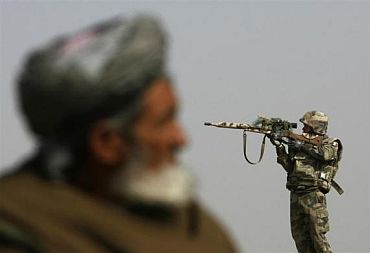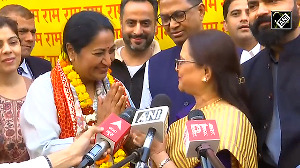 Pakistani journalist Hamid Mir's remarks about Benazir Bhutto, Robin Raphel and the Taliban, published in the Indian Express newspaper some weeks ago, Kolkata's The Telegraph newspaper reported on Sunday, provoked the investigation of the controversial American diplomat whose home and office were searched by the FBI last week.
Pakistani journalist Hamid Mir's remarks about Benazir Bhutto, Robin Raphel and the Taliban, published in the Indian Express newspaper some weeks ago, Kolkata's The Telegraph newspaper reported on Sunday, provoked the investigation of the controversial American diplomat whose home and office were searched by the FBI last week.
Twelve years ago, in a column published on Rediff.com, Hamid Mir, who escaped an assassination attempt in Pakistan in April, made stunning revelations about America, Afghanistan and the Taliban.
'It is important to note that American officials were trying their best to use the Taliban for their oil games till December 1997 when Mullah Ghous was invited to America,' Mir then wrote. 'State Department officials did not show any interest in capturing or killing Osama bin Laden even at that time.'
We reproduce Hamid Mir's 2002 column, Afghanistan's 'pipeline police':
It was in October 1996 that I first came to know about a link between Afghanistan, America, and oil. I was travelling with the then prime minister, Benazir Bhutto, to England and America as the editor of Daily Pakistan, Islamabad.
Bhutto was lobbying hard against elections in Indian-controlled Kashmir, which had been rejected by the All-Parties Hurriyat Conference. She was, however, facing many embarrassing questions on her government's open support for the Taliban.
During one of her lectures in London, Asma Jahangir, a famous Pakistani human rights activist, asked her: "Madam, you are talking about the human rights of Kashmiris, what about the human rights of Afghan women who were recently stopped from attending educational institutions by your blue-eyed Taliban boys?"
At that time, the British media was not only criticising Pakistan, but was also accusing the Central Intelligence Agency of secret support to the Taliban. The Independent even mentioned the names of the American oil company Unocal in those days as the force behind the American support for the Taliban.
But when Benazir Bhutto reached New York to attend the United Nations General Assembly session, no unpleasant questions were raised by the American media.
After returning to Islamabad, I wrote a column focussing on why America was supporting the Taliban. This was published in Daily Pakistanon October 8, 1996. I criticised the pro-Taliban policy of the Benazir government and said Pakistan's name was being tarnished because of the Taliban, who were considered American agents in the European press.
I said that on one side the Americans had declared Osama bin Laden a terrorist, and on the other, Osama was helping the Taliban, but the Americans had closed their eyes to this fact.
The very next day, I was invited by the then federal interior minister, Major General Naseerullah Khan Babar, for lunch. He tried to convince me that all patriotic journalists must support the Taliban because they were protecting the economic interests of Pakistan.
What was that economic interest? Babar told me that Afghanistan was a gateway to Central Asia and Iran was trying to close this gate for us through the Northern Alliance for its own interest. He said Pakistan was trying to control Afghanistan with the help of the Taliban, and we were heading towards a gas pipeline project from Turkmenistan to Pakistan via Afghanistan worth billions of dollars. He assured me that the Taliban would not play the American game, but the Pakistani game. I came back unconvinced from this lunch meeting.
Within days I came to know about the growing differences between the Benazir government and US Ambassador to Pakistan Thomas W Simons, Junior. Benazir signed the gas pipeline project with the Argentinian oil company Bridas, while the American ambassador was lobbying for Unocal. He even exchanged hot words with Bhutto on this issue.
Benazir's interior minister came very close to managing a reconciliation between the Taliban and the Northern Alliance. A joint meeting of all factions was arranged in Islamabad on November 6, 1996. One day before this breakthrough, Benazir was ousted from the government by President Farooq Leghari.
After some days Robin Raphel, the then American Assistant Secretary of State, announced her support for the Taliban in the United Nations in New York. This announcement was enough for journalists like me, who were already writing about the Taliban being American agents.
After the rise of anti-Taliban propaganda in the Pakistani press, some pro-Taliban religious elements started contacting journalists who were writing against the student militia. I received an invitation from the head of the Taliban movement, Mullah Omar, to visit Kandahar.
I accepted the invitation and reached the Taliban headquarters in the middle of December 1996. Mullah Omar tried to convince me that they were not working for the Americans, but for their own people. When I asked why Robin Raphel was supporting them in the UN, he promptly asked: "Who is he?"
The one-eyed ruler of Kandahar claimed that American diplomats had visited him and told him: "You cooperate with us by assisting the American oil company and we will cooperate with you."
He, however, asked me a question: "If we are American agents, why have we given refuge to Osama bin Laden?"
His point was valid, but I was not ready to believe that Osama was living in Afghanistan. He offered to arrange a meeting with Osama and said, "After meeting our guest, you must write that the Taliban are not American agents."
Mullah Omar fulfilled his promise after three months and my first interview with Osama bin Laden was arranged in March 1997 at a place near Jalalabad. The main message in this interview was that American troops were based in Saudi Arabia to protect the interests of their oil companies, and that they must vacate the holy land of Muslims.
One close associate of Osama stunned me by telling me that they had given big money to Nawaz Sharief in 1989 for a no-confidence move in parliament against Benazir Bhutto. In turn, the Taliban wanted Sharief to cooperate with them after coming to power. But after coming to power, Sharief sent messages that the Taliban should not create problems for the Americans in Afghanistan.
The Nawaz Sharief government pressurised the Taliban to cancel their memorandum of understanding with the Argentinian company. One Taliban minister, Mullah Ghous, was forced to travel to Boston for a meeting with Unocal officials.
It is important to note that American officials were trying their best to use the Taliban for their oil games till December 1997 when Mullah Ghous was invited to America. State Department officials did not show any interest in capturing or killing Osama bin Laden even at that time.
In February 1998, Unocal Corporation testified to a House committee of the American Congress that 'the Taliban government is an obstacle to having a gas pipeline from the Caspian region to the Indian Ocean --- that is, through Afghanistan.'
The American military power removed this 'obstacle' in November last year (2001) in the name of the war against terrorism. The events of September 11 provided an opportunity to America for attacking Afghanistan and establishing military bases there.
I was the last journalist to interview Osama bin Laden in Afghanistan. After the interview, while we were sipping Arabian tea in his hideout near Kabul, he asked me a question about Zalmay Khalilzad. I showed ignorance about the person.
He informed me that they were going to vacate the big cities of Afghanistan in the coming days for a long guerrilla war, after which Khalilzad would call the shots in Kabul and the Northern Alliance would get nothing.
Within a few days of 'conquering' Afghanistan, President Bush appointed Khalilzad as the special envoy for Afghanistan. This appointment simply meant oil for America. Khalilzad was an adviser to Unocal in the mid-1990s. He even met a Taliban delegation in Boston five years ago as a Unocal official.
It is worth mentioning that the Bush family has a strong oil background. So do some of his top aides. From American Vice-President Dick Cheney to the director of the National Security Council, Condoleezza Rice, many top-ranking officials of the Bush administration have worked for American oil companies. These companies are in international competition for the Caspian Sea resources.
Russian and German oil companies had been trying to establish a pipeline from the Caspian Sea through Eastern Europe, but the American bombing of Yugoslavia blocked this plan. But Russia brokered a treaty with Iran for a pipeline route. China also began negotiating to build oil and gas pipelines from Kazakhstan.
The Americans want to build pipelines from the Central Asian States to Pakistan via Afghanistan because this is the shortest route to the Asian markets. The 1,271 km proposed pipeline from Turkmenistan to Pakistan will terminate at Multan, where it will merge with an existing pipeline system heading towards the seaport of Karachi. The Americans also proposed another 644 km extension from Multan to New Delhi for the Indian market, but Pakistan discouraged this plan because of its tense relations with India over Kashmir.
It is obvious that not only Russia and Iran, but also China is unhappy about the growing American influence around the oil and gas resources of Central Asia. Americans have their troops not only in Afghanistan, but also in Uzbekistan and Kazakhstan.
These troops are not there to fight terrorism. Their real task is to act as the 'pipeline police' of American oil companies. They landed in Afghanistan for a long stay and the danger cannot be ruled out that Afghanistan will become a battlefield for an oil war between Iran, Russia, and America.
Pakistan may go with America in this future war, but it will be difficult for India to say goodbye to old friends Iran and Russia. One year after September 11, the politics of oil has prevented peace from taking root in Afghanistan. Iran and Russia are using the ministers of the Northern Alliance to create problems for pro-American President Hamid Karzai, who is facilitating Unocal not only in Kabul but also in Kandahar.
Two pro-Karzai ministers, Abdul Rehman and Haji Qadir, have been murdered in the last six months in Kabul. The President of Afghanistan has abandoned all his Afghan security guards because he cannot trust them. His personal security has been taken over by the 'pipeline police' because he is very important for Unocal.
The war on terrorism has been converted into a war for the oil and gas of Central Asia. The problems that emerged after September 11 last year remain unsolved even whilst there are many new problems.
Image: A US sniper keeps watch over Qarabagh district, north of Kabul. Photograph: Ahmad Masood/Reuters.
ALSO READ:











 © 2025
© 2025